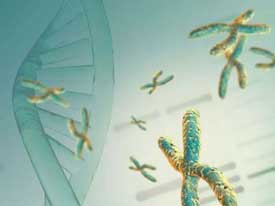Family Matters
Family Matters: When Cancer Is Inherited

Genetic counseling provides guidance even after diagnosis.
If you've been diagnosed with cancer, you already know something has gone wrong inside your body's cells.
But how do you know if the genetic changes that caused your cancer were something you inherited or something that just happened sometime during the course of your life? Kara Milliron is a genetic counselor with the U-M Rogel Cancer Center's Breast and Ovarian Risk Evaluation Program. We talked with her to find out what patients should know.
Let's put this into perspective: Of women diagnosed with breast cancer each year, how many will have a genetic mutation that led to their disease?
The majority of the 200,000 new cases of breast cancer each year is considered sporadic: It happens by chance. But about 5 percent to 10 percent of these cases are due to an inherited susceptibility. What this means is that women have inherited genes from their parents that make them more likely to develop breast cancer.
- Multiple cases of breast cancer have occurred in family members younger than 50.
- A woman with ovarian cancer has a family history of breast or ovarian cancer.
- A woman has both primary breast and ovarian cancers. This means that two distinct cancers are in the body, not that one cancer has spread to other organs.
- A man has breast cancer.
- A woman is diagnosed at 40 or younger, regardless of family history.
- A woman is a member of a population -- including Ashkenazi Jews, Dutch or Icelanders -- known to carry the mutation.
Can you explain how these genes work to increase risk?
Just like eye color, genes that impact cancer risk may be inherited. Two genes in particular, BRCA1 and BRCA2, are involved in increasing the risk for breast and ovarian cancers. Normally, these genes work to prevent cancer, but changes -- or mutations -- can cause them to function improperly. Women who have BRCA1 or BRCA2 mutations face a 55 percent to 85 percent lifetime risk of breast cancer and a 16 percent to 60 percent lifetime risk of ovarian cancer. In comparison, the general population carries a 1.7 percent risk for ovarian cancer and a 12.5 percent risk for breast cancer.
If someone has already been diagnosed with cancer, why would genetic testing be important?
Genetic testing may provide information you can use to make medical decisions. For example, it can help guide surgical decisions when a woman is considering a lumpectomy -- a procedure that removes the tumor along with a small margin of tissue -- or a mastectomy, which removes one or both breasts. Genetic testing can also help a patient understand her ovarian cancer risk, along with helping identify relatives who could be at risk.
For relatives who carry BRCA1 or BRCA2 mutations but do not have cancer, we guide them through three decision-making paths that may help to reduce their risk of developing cancer, ranging from increased screening to preventative surgery. These are all very personal decisions that have everything to do with where a woman is in her life.
How does testing work?
Before any decisions are made about testing, I review the family history to try to determine the potential risk for either having the condition or passing it on to future generations. The best person for initial testing in the family is a cancer survivor so that we can try to determine which genes contributed to that individual's cancer.
What about genetic discrimination?
Federal and state laws specifically state that genetic testing cannot be used to deny a person employment or group health insurance. However, life and disability insurance generally are not covered by these laws, so we encourage people to purchase these insurances before they undergo genetic testing.
How do you help in the process?
I explain how genes work. Specifically, we talk about how mutations can lead to cancer development and the differences between mutations that are passed down in families and those that are acquired during an individual's life. We talk about the risks, benefits and limitations of genetic screening, and, along with a physician, we discuss options that may help reduce the risk of developing cancer. Some of our high-risk patients opt not to undergo genetic testing after their counseling appointment. We respect that. The individual's right to not know if they have an inherited susceptibility is just as important as their right to know.
Continue reading the Fall, 2007 issue of Thrive.
